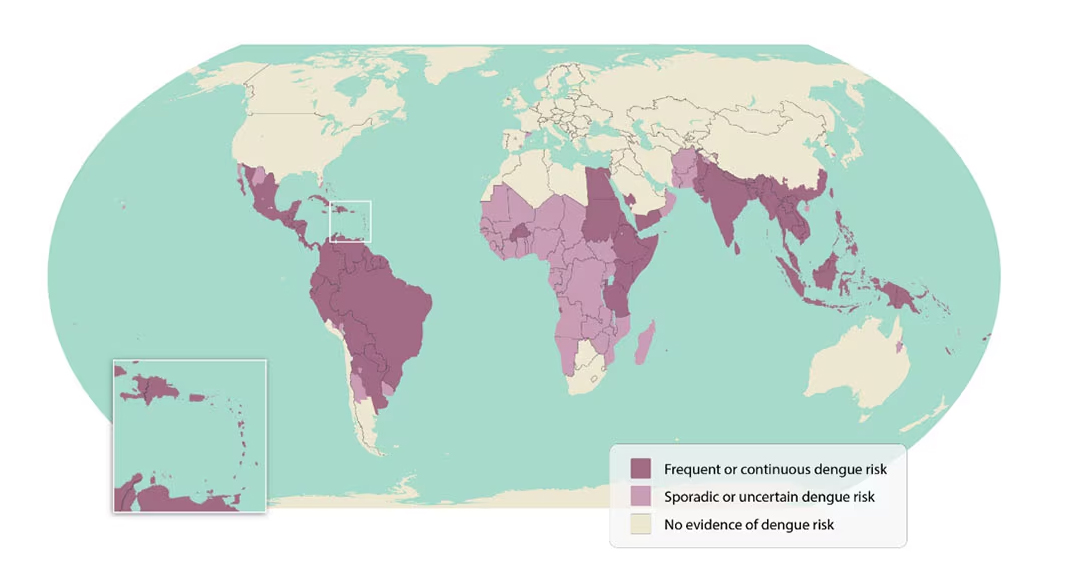
Dengue (aka “breakbone fever”) is a viral infection spread to people by Aedes species mosquitoes infected with the dengue virus. Cases can range from asymptomatic to mild to severe to death. The most common symptoms are fever, body aches or pain, severe pain behind the eyes, severe headache, nausea, vomiting, and rash. Severe forms of dengue are known as dengue hemorrhagic fever (DHF).
Dengue is common in tropical and subtropical areas, with the areas affected increasing due to a warming climate (see, for example, dengue fever is surging worldwide. A hotter planet will make it worse ). Almost half of the world's population, about 4 billion people, live in areas with a risk of dengue.

- World map highlighting areas of dengue risk
In the U.S., dengue frequently occurs in the territories of American Samoa, Puerto Rico, and the U.S. Virgin Islands, and the freely associated states, including the Federated States of Micronesia, the Republic of Marshall Islands, and the Republic of Palau. (from CDC and WHO). In the continental U.S., cases of dengue occur most frequently in travelers with the infection returning from affected areas (~1,800 cases in 2023); however, direct transmission of the dengue virus, in which an infected mosquito transmits the virus to a human in the U.S. (known as locally acquired), occurs much less frequently. For example, in 2023, Texas experienced 79 dengue cases, of which one was acquired locally. So far this year, as of July 11, 2024, Texas has confirmed 10 cases of dengue; all appear to have been acquired during international travel.
Avoiding mosquito bites is the best way to prevent dengue infection. Some tips to avoid mosquito bites are to use insect repellent, empty standing water, wear protective clothing, and limit time outside at dusk and dawn. The Aedes species mosquitoes that transmit dengue also transmit other viruses, such as Zika and Chikungunya.
While there is an FDA-licensed vaccine in the US to protect against dengue in special circumstances, the manufacturer is discontinuing production due to lack of demand. However, doses will be available in Puerto Rico until 2026. Click here for more information on dengue vaccination.
Dengue is diagnosed via a blood test and treated using supportive measures, such as pain relievers that do not contain aspirin. There is no specific treatment. If you suspect that you may have dengue, advise your physician of any illness with fever occurring within 2-3 weeks after leaving a tropical area. If diagnosed with dengue, avoid pain relievers that contain aspirin; use those with acetaminophen instead. Rest and drink plenty of fluids.
In collaboration with UTHealth Houston School of Public Health and Baylor College of Medicine, TEPHI established and is currently expanding the statewide Texas Wastewater Environmental Biomonitoring (TexWEB) network. TexWEB has the ability to detect dengue signal in wastewater. As of July 15, TexWEB has not detected dengue signal in Texas network’s wastewater samples.
Texas Department of State Health Services
Center for Disease Control (CDC)
World Health Organization (WHO)
Pan American Health Organization (PAHO)
Mayo Clinic